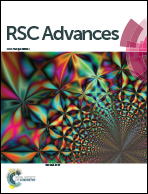Facile synthesis of germanium–reduced graphene oxide composite as anode for high performance lithium-ion batteries†
Abstract
Germanium is a promising anode material for lithium ion batteries (LIBs) due to its high specific capacity, but it still suffers from poor cyclability. A simple method was developed to synthesize Ge–reduced graphene oxide nanocomposites using organic germanium as a precursor. The nanocomposites exhibit improved electrochemical performance with a reversible specific capacity of 814 mA h g−1 after 50 cycles at a current density of 0.1 A g−1. When cycled at a high current density of 2 A g−1, they still deliver a reversible specific capacity of 690 mA h g−1 after 150 cycles. The improved electrochemical performance is attributed to the unique nanostructure (0D electroactive particles in 2D mixed conducting matrix), which conferred a variety of advantages: high flexibility of the graphene sheets for accommodating the volume change, good electrochemical coupling and short transport length for ions and electrons, enabling low contact resistances.


 Please wait while we load your content...
Please wait while we load your content...